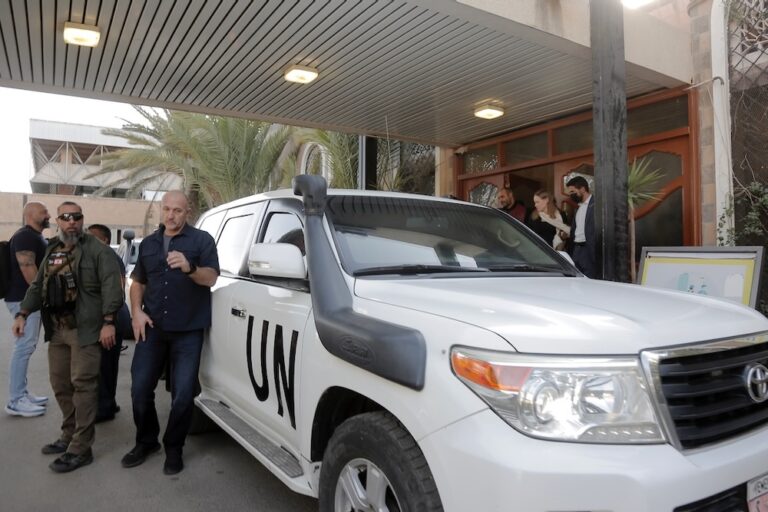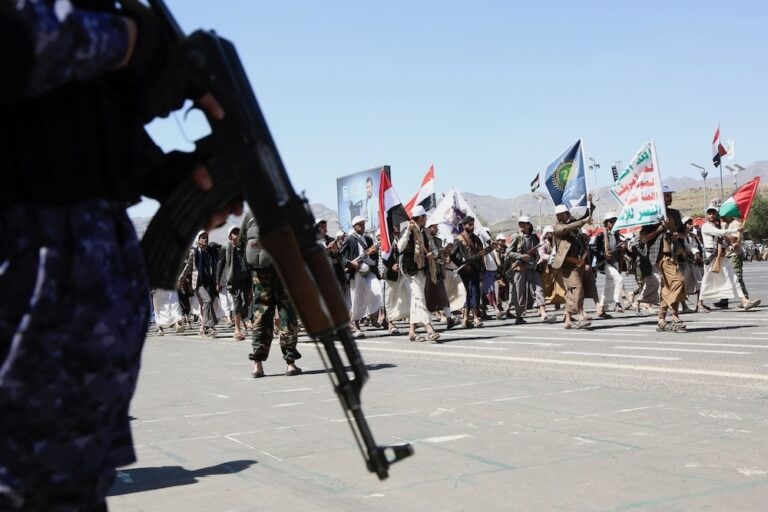Majed Karout was tried over a composite photo posted on Facebook by another person on 18 February 2011 in which Karout was tagged. It implied that the head of the Al-Bayda branch of the state communications agency was involved in corruption.
(RSF/IFEX) – 7 June 2012 – Reporters Without Borders condemns the one-year jail sentence and fine of 200,000 ryals (750 euros) that a court in the central province of Al-Bayda imposed on reporter Majed Karout in his absence on 4 June for allegedly posting “lies” about a local official on Facebook. Karout is a correspondent for the Masdar Online news website.
“We are outraged by this disproportionate sentence,” Reporters Without Borders said. “Aside from the fact that the charges are completely
unfounded, the judicial authorities flouted Karout’s right of defence by failing to notify him that the trial was taking place.”
Karout was tried over a composite photo posted on Facebook by another person on 18 February 2011 in which Karout was tagged. It implied that the head of the Al-Bayda branch of the state communications agency, Mohamed Moussa Al-Qarfoushi, was involved in corruption.
The photo was accompanied by a letter of several pages purportedly written by employees of the agency and addressed to the communication minister and other senior officials. It listed many irregularities allegedly committed by Qarfoushi, some for the purpose of self-enrichment.
Qarfoushi and the branch’s financial director, Kamal Al-Najjar, filed a lawsuit two days after the photo and letter were posted. Curiously, the lawsuit named Karout, although he was not the letter’s author and was not the person who had posted the letter and photo online.
The prosecutor drafted an indictment on the basis of the complaint and the Al-Bayda provincial court held an initial series of three hearing, the latest of them just over five months ago. Karout was not sent a summons to any of these hearings, in violation of his most basic defence rights, and only discovered that he was being prosecuted after noticing that he was named in a summons printed in the official newspaper, Al-Jomhuryah.
He went to the court on the date named in this summons, only to learn that the hearing had been adjourned because the judge had taken a vacation.
The fourth and final hearing was finally held on 4 June, after the judge had returned from his vacation. Again, Karout was not notified. In his absence, the court passed the one-year jail sentence after convicting him of “publishing, in full knowledge and with intention to harm, information mendaciously implicating Mohamed Moussa Al-Qarfoushi and Kamal Najjar on the Internet, via the Facebook website.”
Karout learned yesterday that the judge had again left the region after issuing his verdict. Reached by Reporters Without Borders, Karout said he had filed an appeal but added that the appeal court’s judges have also all been absent for more than eight months.
The way Karout has been prosecuted and convicted suggests that it may have been orchestrated with the aim of gagging him. His coverage of local corruption and demonstrations in Al-Bayda may have induced the local authorities to take advantage of the Facebook post to try to put a stop to his journalistic activities.
Karout was insulted and threatened by Al-Bayda governor Mohamed Nasser Al-Amiry in July 2010 after writing several articles criticizing his policies and accusing him of corruption. In Yemen, harassment of journalists who cover about corruption, especially local corruption, is almost systematic.


